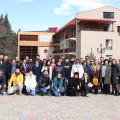An interview with Anna Hakobyan, on the occasion of the 10th anniversary of the Armenian Center
KANCH, interview by Liana Chichakyan
KANCH, a magazine for the children and youth of Armenia, 8 August 20021, Wednesday, Issue 32 (5893)
ANNA HAKOBYAN
President of the Armenian Center of P.E.N. International Writers’ Association
- The Armenian Center of P.E.N. International Writers’ Association has celebrated the 10th anniversary of its establishment, but let us admit that the public has a very fragmented understanding of the Center’s activities. Even writers that are P.E.N. members have difficulty defining P.E.N.
- In 1921, when Galsworthy founded the P.E.N. International Association in London, neither he nor the few writers that had gathered around him could have possibly imagined that eight decades later, writers in 140 countries would unite around a charter that consisted of just a few points…
P.E.N.’s activities are dictated by the Charter that has been refined over the past 80 years and redeveloped, with its original solid foundation. The individual points in the Charter are simple and easy to understand. Any writer seems to be eligible for P.E.N. membership. But the Charter says, “Literature, irrespective of its national origins, knows no frontiers and must remain common currency among people in spite of political upheavals.” A P.E.N. member cannot be a chauvinist or anyone that has accepted the ideology of a political party. They must be above national and political passions.
This is why many of our writers that belong to one political party or the other must withdraw from PEN, including Ruben Hovsepyan, Azat Yeghiazaryan, and others. According to the new bylaws, even writers that occupy senior government positions cannot be P.E.N. members.
As for P.E.N.’s activities, there are many large-scale programs being implemented. They related to literary policy, exchange of literary culture, the rights of writers and people of literature as well as defending freedom of speech.
- Even though the Armenian P.E.N. Center is 10 years old, it has only shown signs of life over the past one or two years. How would you explain that?
- I would not want to point fingers, but we have to look at reality with sincerity. In the times of Gevorg Emin, the Armenian P.E.N. Center consisted of the same elite from the Writers’ Union - Silva Kaputikyan, Anahit Sahinyan, Hrant Matevosyan, Maro Margaryan, Hamo Sahyan, Gevorg Emin, Edward Jrbashyan. I have nothing against these people, but you can already see from the list that they could not come together under the P.E.N. Charter. They were dedicated writers. Also, P.E.N. membership should have gone beyond just writers. This should have involved journalists, translators, publishers, historians, linguists, and others. This is my explanation for the relative inactivity or passive state of the Center during its first eight years.
In the last two years (I have headed the Center since 1999), one can notice slight signs of life; there is some action. But even now, many of our members are careful to avoid being “too active”. Let me give you an example. P.E.N. International organizes a congress every year. Last year, we signed a declaration in Moscow against the war in Chechnya. Some people in the Armenian P.E.N. were accusing me of taking this “dangerous” and “anti-government” step. But I have nothing to fear because my attitude comes from the Charter, we need to oversee government behavior.
- Writers from dozens of countries attend the Congress, including states that have serious political issues with each other. What can you say about the relations between writers from such countries?
- Politics is everywhere these days, and so P.E.N. has automatically also been politicized to some extent. But culture, literature as well as the rights of people that are associated with writing and literature have been and remain its main mission.
- How many members does the Armenian P.E.N. Center have today?
- A minimum of 25 people is needed for the P.E.N. Center to survive. The membership fee is 12 dollars a year, but nobody is bothered about paying it. I have been paying it myself for the past three years. It’s madness, of course, but it is important. If necessary, you can then address P.E.N. International as an equal. I felt the influence of P.E.N. to a greater extent when it came to the cases of Nikol Pashinyan, Ashot Bleyan, and Vahagn Ghukasyan.
There are countless writers’ associations in the world, but P.E.N. International is sponsored by the UN and UNESCO. I think that says a lot.
- What steps is the Armenian P.E.N. Center taking when it comes to shaping the literary environment in Armenia?
- Almost every year, we organize an award ceremony with nominations in the areas of poetry, essay and novel writing. The prize money is modest. Every year on March 21, we celebrate the Day of Poetry. We come together, debate, and organize discussions. I want P.E.N. to work, to bring together people that have a sense of purpose.
On the other hand, we have cases where, for example, Silva Kaputikyan disqualified herself when she said that she was used to constantly being at the center of attention, in her words, that she constantly needed ‘affection’.
- And are there many writers with this sense of purpose?
- Very often, we are biased when we pass judgment. Let us consider reality from a simple, human point of view. You can take 10 pieces of literature and barely find two things of value. And we also lack tolerance.
For example, Violet Grigoryan’s piece is perhaps not in my taste, but I accept it as a manifestation of who she is, she is not pretending to be someone else. I have no right to pass absolute judgment on it and, particularly, to shape public opinion based on my subjective assessment.
- The first Almanac of the Armenian P.E.N. Center has the following thought in the foreword “This bilingual publication does not aim to present Armenian literature to the world…”
Why? Do you not feel a painful need to present Armenian literature to the world?
- It would be right to first clarify what we have today, what do we mean by modern Armenian literature? Even if we can select from the available pieces today, we will have an issue when it comes to translators.
All kinds of people are doing translations these days, but those aren’t real translations. Do you know why the publication of our Almanac took more than two years when it only takes two or three months to publish a book? Yes, we lacked resources, but the first big issue was the dearth of quality translators.
It might seem unlikely, but I often included my personal payment as the prize money. This was not as crazy as it sounds. I’m certain that we will shake ourselves out of this literary slumber sooner or later, the organization will function to its full extent, and those difficulties will be compensated.



